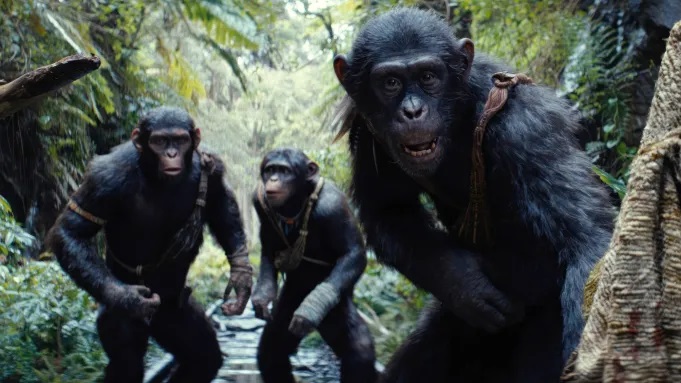According to statistics from Exhibitor Relations, the science fiction action film “Kingdom of the Planet of the Apes” released by 20th Century Studios and Disney has become became the North American box office champion last week, with an estimated revenue of 56.5 million USD in its opening weekend.

This achievement puts the film in the Top 3 films with the most impressive opening weeks in North America since the beginning of the year, after “Dune: Part Two” (with 81.5 million USD) and “Kung Fu Panda 4” (with $81.5 million). 58.3 million USD).
As the 10th installment in the “Planet of the Apes” series (started in 1968), as well as the 4th film in the franchise’s reboot series, “Kingdom of the Planet of the Apes” carries the responsibility succeeding the legacy left by the previous three popular films.
Accepting the helm of this project, the challenge that director Wes Ball faces is to continue the story of the monkey’s journey, now that there is no longer leader Caesar – the character considered the soul of the merchant. “Planet of the Apes”.
“Kingdom of the Planet of the Apes” is set 300 years after the events of the film “War for the Planet of the Apes” (released in 2017). At this time, monkeys – talking primates – dominated the planet, while wild humans lived on the edge of civilization and had to hide in the shadows. The film’s story follows Noa (Owen Teague), a young monkey from the Eagle tribe. One day, his village was attacked by the army of lord Proximus Caesar (Kevin Durand). When his father died, all of Noa’s relatives and villagers were also taken into slavery. Faced with this great loss, Noa determined to set out to rescue the tribe and fight the tyrant. On this journey, he meets a human girl named Mae (played by Freya Allen) and Raka (played by Peter Macon) – an old orangutan imbued with the commandments left by the late leader Caesar.
Opening a story line with a completely new cast of characters, “Kingdom of the Planet of the Apes” must spend a lot of time leading viewers to the film’s setting. That was quite a while after Caesar’s death. The monkeys became more and more intelligent, starting to form tribes. Only Caesar’s glorious journey through many generations has gradually faded from the memory of the species.
While humans under the influence of the ALZ-113 virus have degenerated, returning to the wild period. They are called “Echo” (remnant) by the monkeys. However, people still have some secret warehouses of technology and weapons. That is the reason why Proximus Caesar borrowed the name Caesar and enslaved his fellow humans to open this warehouse door. He believes that it is the “key to accelerated evolution” for his species.
With a large production budget, mainly for post-production, “Kingdom of the Planet of the Apes” treats viewers to a sumptuous entertainment feast throughout its 144-minute duration. The shots feature a series of wild, majestic natural scenes appearing before the audience’s eyes, from mountains and vast forests to the living places of clans and tribes… They are vivid and real. It’s overwhelmingly realistic, but set in a post-apocalyptic context under the rule of monkeys, combined with the dark film color, it brings a feeling of anxiety and insecurity.
Besides, the tribe’s daily life scenes are also recreated with great skill. The film of Noa and her close friends venturing to climb a cliff, searching for eagle eggs to complete the ritual before adulthood, creates a strong visual impression, awakening the audience’s excitement.
Meanwhile, close-ups closely follow each character’s expression. Monkeys appear under Wes Ball’s lens with a full range of emotions, from sadness, joy, anger to despair, and sometimes even compassion. This success is largely thanks to motion-capture technology, which captures every expression and movement, even the smallest, thereby helping to convey emotions realistically.
On the review site Rotten Tomatoes, “Kingdom of the Planet of the Apes” received a positive rating of up to 80% from movie experts.
News
MEGHAN MARKLE’S LATEST EFFORT UNDER FIRE: IS IT JUST SELF-PROMOTION?
Meghan Markle’s newest venture is facing criticism long before production has even begun! “The problem is I sometimes think Meghan can’t let go and wants it to be about her…” royal expert Rupert Bell dished on the “Kinsey Schofield Unfiltered” podcast. SOURCE:…
‘GOOD KING HARRY’: PRINCESS DIANA FELT THAT FUTURE ROYAL TELL-ALL SCRIBE WOULD MAKE ‘A BETTER’ MONARCH THAN PRINCE WILLIAM
Diana, Princess of Wales, once nicknamed her youngest son “Good King Harry,” due to his “general gusto” compared to the real future monarch and his elder brother, Prince William. “William doesn’t want to be king and I worry about that,” royal author Angela Levin wrote in…
FORGING HER OWN PATH: LADY LOUISE WINDSOR TO AVOID ‘ROYAL BURDEN’ AS SHE FOCUSES ON UNIVERSITY LIFE
Lady Louise Windsor, 20, and 16th in line to the British throne has decided to create her own path in life after previously contemplating a life of service to the Crown. “I think it’s probably too early to tell,” GBN’s royal correspondent Cameron…
“Royal Restructure Stumbles: Princess Anne’s Injury Puts Strain on Slimmed-Down Monarchy”
Prince William has reportedly taken King Charles III’s “slimmed-down monarchy” initiative to the extreme. But as the next king readies to slim down the Crown even more than his dad, a “severe warning” has been issued by some royal analysts when it comes…
FORTUNE FAVORS THE BOLD: KING CHARLES TO UNLEASH MONEY-MAKING STREAM AT ROYAL LODGE ONCE HE KICKS PRINCE ANDREW OUT
King Charles III is reportedly set to start a rental money-making stream once he finally boots his younger brother, Prince Andrew, from the Royal Lodge near Windsor Castle. “Rental of £1million a year is not far-fetched for a house of that size…
Jemele Hill Unleashes Furious Rant Claiming Caitlin Clark Receives Different Treatment From Media Compared To Black Players
Jemele and Caitlin Clark (Photo by Leon Bennett/Getty Images) (Photo by Andy Lyons/Getty Images) Jemele Hill has a serious issue with Caitlin Clark, but it’s not from something she did or said, but from the media who covers her. Caitlin Clark, the…
End of content
No more pages to load











